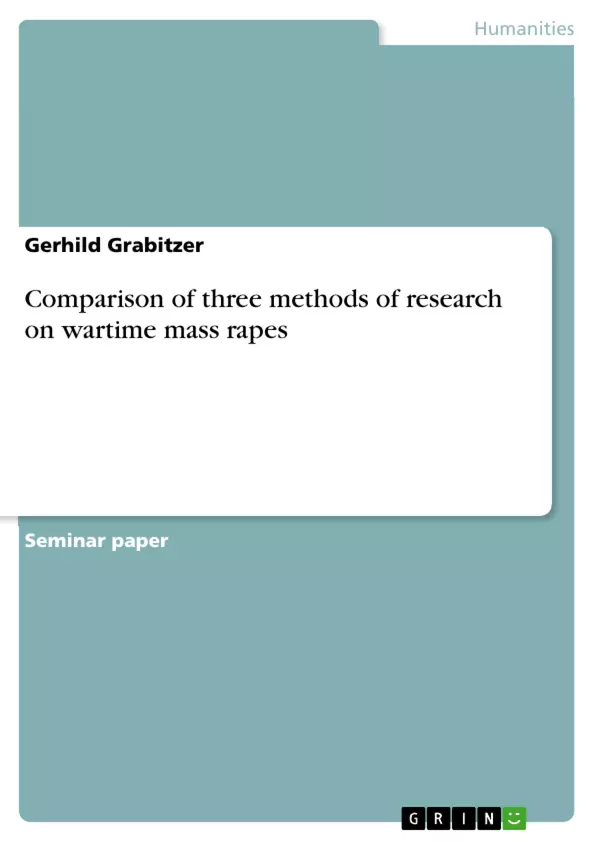In this essay, I will take a closer look at three very different studies and the ability of the methods uses to fulfil their research goals. The subject that they have in common is mass rape of women during wartime.
Inhaltsverzeichnis (Table of Contents)
- INTRODUCTION
- ARTICLES
- Article 1: „Why Do Soldiers Rape? Masculinity, Violence, and Sexuality in the Armed Forces in the Congo (DRC) (Baaz and Stern, 2009)
- Article 2: „Stories of Wartime Rape Victims: The Deconstruction of Lived Experiences in the Balkan Conflict\" ten Bensel, Sample
- Article 3: „Trauma and Current Post-traumatic Stress Symptoms in Elderly German Women Who Experienced Wartime Rapes in 1945“, Kuwert et al., 2010.
- EVALUATION
Zielsetzung und Themenschwerpunkte (Objectives and Key Themes)
This essay examines three diverse research studies on wartime mass rape, analyzing their methodologies and their effectiveness in achieving their research goals. The aim is to demonstrate how different research approaches can influence findings and the ability to address complex research questions related to this sensitive subject.
- The impact of war on women
- The motivations and justifications of perpetrators, exploring factors such as masculinity, militarization, and social contexts.
- The importance of understanding both perpetrators and victims in comprehending the complexities of wartime rape.
- The need for effective treatment programs for survivors of wartime sexual violence, particularly in conflict zones and for elderly survivors.
Zusammenfassung der Kapitel (Chapter Summaries)
The first article, "Why Do Soldiers Rape? Masculinity, Violence, and Sexuality in the Armed Forces in the Congo (DRC) (Baaz and Stern, 2009)," focuses on understanding the motivations of soldiers who commit rape during wartime in the Democratic Republic of Congo. It examines the connection between sexual violence, militarization, and masculinity through qualitative focus group interviews with soldiers. The research reveals a distinction between "lust rape" and "evil rape," suggesting that soldiers justify rape based on their harsh living conditions, underpayment, and frustration.
The second article, "Stories of Wartime Rape Victims: The Deconstruction of Lived Experiences in the Balkan Conflict" by ten Bensel and Sample, adopts a criminological approach to analyze wartime rape. It focuses on the victims' experiences and explores the similarities and differences between wartime rape and interpersonal criminal rape, emphasizing the unique challenges faced by wartime rape victims, such as repeated assaults and displacement.
The third article, "Trauma and Current Post-traumatic Stress Symptoms in Elderly German Women Who Experienced Wartime Rapes in 1945," by Kuwert et al., 2010, investigates the long-term effects of wartime rape on elderly German women who experienced sexual violence during World War II. The study highlights the enduring trauma and significant post-traumatic stress symptoms among these survivors, emphasizing the need for treatment programs tailored to the needs of elderly survivors.
Schlüsselwörter (Keywords)
Wartime rape, sexual violence, war trauma, post-traumatic stress disorder (PTSD), military sexual violence, focus group interviews, case study research, court transcripts, survivors, perpetrators, masculinity, militarization, conflict zones, treatment programs, ethical considerations.
Frequently Asked Questions
What is the focus of the research on wartime rapes?
The paper compares three different methods used to study mass rapes during conflicts in the Congo, the Balkans, and WWII Germany.
Why do soldiers commit rape according to the Congo study?
Soldiers often justify rape as a result of harsh living conditions, lack of pay, and a distorted sense of masculinity and militarization.
What is the difference between "lust rape" and "evil rape"?
This distinction, found in the Congo research, refers to how perpetrators categorize and justify their acts of sexual violence.
How does wartime rape affect elderly survivors?
A study of German women from 1945 shows that trauma and post-traumatic stress symptoms can endure for decades into old age.
What methodologies are compared in the essay?
The essay evaluates qualitative focus group interviews, criminological deconstruction of experiences, and clinical trauma assessments.
What is the unique challenge for victims in conflict zones?
Victims often face repeated assaults, displacement, and a total lack of social or legal protection compared to interpersonal criminal rape.
- Arbeit zitieren
- Gerhild Grabitzer (Autor:in), 2019, Comparison of three methods of research on wartime mass rapes, München, GRIN Verlag, https://www.hausarbeiten.de/document/495764


